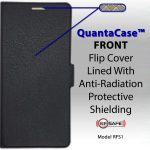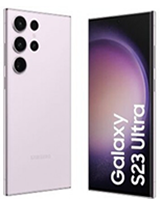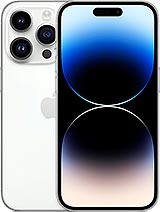To maximize your SAR comparison experience with color-coded SAR charts, please view the comparison in landscape mode. Position the top and bottom of your phone to the left and right to maximize screen size. Adding a third phone to compare is only recommended for tablets and computers with larger screens. Use the dropdown to continue.
Samsung Galaxy S23 Ultra vs Apple iPhone 14 Pro
- Product Name
- Product Image
-
RF Protection
Samsung Galaxy S23 Ultra SAR Level Summary:
The cellular transmission SAR values for the Samsung Galaxy S23 Ultra (FCC ID A3LSMS918B) are 0.98 W/kg (watts per kilogram) at the head and 1.10 W/kg when worn on the body. The simultaneous transmission SAR values for Samsung Galaxy S23 Ultra (cellular plus Wi-Fi) is 1.59 W/kg at the head, 1.59 W/kg when worn on the body, and 1.54 W/kg when used as a hotspot simultaneously with other transmitters active.
Galaxy S23 Ultra Radiation Safety Accessories
RF Safe® Samsung Galaxy S23 Ultra QuantaCase™ RFS1 Phone Radiation Shield
$69.99
Apple iPhone 14 Pro SAR Level Summary:
The cellular transmission SAR values for the Apple iPhone 14 Pro (FCC ID BCG-E8140A) are 1.15 W/kg (watts per kilogram) at the head and 1.15 W/kg when worn on the body. The simultaneous transmission SAR values for Apple iPhone 14 Pro (cellular plus Wi-Fi) is 1.464 W/kg at the head, 1.495 W/kg when worn on the body, and 1.566 W/kg when used as a hotspot simultaneously with other transmitters active.
iPhone 14 Pro Radiation Safety Accessories
RF Safe® iPhone 14 Pro QuantaCase™ RFS1 Phone Radiation Shield
$69.99
General
- Samsung Galaxy S23 UltraApple iPhone 14 Pro
-
Phone
Samsung Galaxy S23 Ultra Apple iPhone 14 Pro
-
Technology
GSM / CDMA / HSPA / EVDO / LTE / 5G GSM / CDMA / HSPA / EVDO / LTE / 5G
-
Announced
01 February 2023 07 September 2022
-
Status
Available Available. Released 2022, September 16
-
Price
C$ 1,649.99 / ₹ 124,999 / $ 1,055.00 / £ 999.00 / € 1,170.00 ₹ 159,900 / $ 1,499.99 / £ 1,099.00 / € 1,299.00
-
Model Names
SM-S918B, SM-S918B/DS, SM-S918U, SM-S918U1, SM-S918W, SM-S918N, SM-S9180, SM-S918E, SM-S918E/DS A2890, A2650, A2889, A2892, iphone15,2
Display
- Samsung Galaxy S23 UltraApple iPhone 14 Pro
-
Type
Display Technology => A number of display technologies and types used in mobile phones => TFT (Thin Film Transistor), IPS (In-Place Switching), OLED (Organic Light Emitting Diode), AMOLED (Active-Matrix Organic Light-Emitting Diode), Super AMOLED (an even advanced version of AMOLED), Resistive Touchscreen (Resistive touchscreens contain two layer of conductive material with a very small gap between them which acts as a resistance), Capacitive Touchsceen (Capacitive touchscreen technology consists of a layer of glass coated with a transparent conductor) Dynamic AMOLED 2X, 120Hz, HDR10+, 1200 nits (HBM), 1750 nits (peak) LTPO Super Retina XDR OLED, 120Hz, HDR10, Dolby Vision, 1000 nits (typ), 2000 nits (HBM)
-
Size
6.8 inches, 114.7 cm2 (~89.9% screen-to-body ratio) 6.1 inches, 91.7 cm2 (~87.0% screen-to-body ratio)
-
Resolution
1440 x 3088 pixels (~500 ppi density) 1179 x 2556 pixels, 19.5:9 ratio (~460 ppi density)
-
Protection
Display Protection => Gorilla Glass is a special alkali-aluminosilicate glass shield with exceptional damage resistance that helps protect mobile displays from scratches, drops, and bumps of everyday use, It is always better to go for a smartphone with Gorilla Glass for that added protection and peace of mind. Corning Gorilla Glass Victus 2 Scratch-resistant ceramic glass, oleophobic coating
-
Features
Always-on display Scratch-resistant ceramic glass, oleophobic coating Always-On display
-
Display Test
Contrast ratio: Infinite (nominal) Contrast ratio: Infinite (nominal)
Camera
- Samsung Galaxy S23 UltraApple iPhone 14 Pro
-
Main Camera
Camera is able to capture photographs and usually videos, The most important characteristics of a camera are the resolution (measured in megapixels), lens focus type (fixed or automatic), higher megapixel cameras are known to capture higher quality photos, but not always a good measurement of the photos quality. Quad Camera: 200 MP, f/1.7, 24mm (wide), 1/1.3", 0.6m, multi-directional PDAF, Laser AF, OIS
10 MP, f/4.9, 230mm (periscope telephoto), 1/3.52", 1.12m, Dual Pixel PDAF, OIS, 10x optical zoom
10 MP, f/2.4, 70mm (telephoto), 1/3.52", 1.12m, Dual Pixel PDAF, OIS, 3x optical zoom
12 MP, f/2.2, 13mm, 120 (ultrawide), 1/2.55", 1.4m, Dual Pixel PDAF, Super Steady video Triple Camera: 48 MP, f/1.8, 24mm (wide), 1/1.28", 1.22m, dual pixel PDAF, sensor-shift OIS
12 MP, f/2.8, 77mm (telephoto), 1/3.5", PDAF, OIS, 3x optical zoom
12 MP, f/2.2, 13mm, 120 (ultrawide), 1/2.55", 1.4m, dual pixel PDAF
TOF 3D LiDAR scanner (depth) -
Main Features
LED flash, auto-HDR, panorama Dual-LED dual-tone flash, HDR (photo/panorama)
-
Video
8K@24/30fps, 4K@30/60fps, 1080p@30/60/240fps, 1080p@960fps, HDR10+, stereo sound rec., gyro-EIS 4K@24/25/30/60fps, 1080p@25/30/60/120/240fps, 10-bit HDR, Dolby Vision HDR (up to 60fps), ProRes, Cinematic mode (4K@24/30fps), stereo sound rec.
-
Selfie Camera
Single Camera: 12 MP, f/2.2, 26mm (wide), Dual Pixel PDAF Single Camera: 12 MP, f/1.9, 23mm (wide), 1/3.6", PDAF, OIS (unconfirmed)
SL 3D, (depth/biometrics sensor) -
Selfie Camera Features
Dual video call, Auto-HDR, HDR10+ HDR, Cinematic mode (4K@24/30fps)
-
Selfie Camera Video
4K@30/60fps, 1080p@30fps 4K@24/25/30/60fps, 1080p@25/30/60/120fps, gyro-EIS
Battery
- Samsung Galaxy S23 UltraApple iPhone 14 Pro
-
Type
Battery Type => Cell phones run on various kinds of batteries depending on the manufacturer, phone size or shape and features. There are basically four types of cell phone batteries => Lithium Polymer, Lithium Ion, Nickel Metal Hydride and Nickel Cadmium. Li-Ion 5000 mAh, non-removable Li-Ion 3200 mAh, non-removable (12.38 Wh)
-
Battery Test
Battery Capacity is a measure (typically in Amp-hr) of the charge stored by the battery, and is determined by the mass of active material contained in the battery. The battery capacity represents the maximum amount of energy that can be extracted from the battery under certain conditions. Endurance rating 126h Endurance rating 86h
-
Charging
45W wired, PD3.0, 65% in 30 min (advertised)
15W wireless (Qi/PMA)
4.5W reverse wireless Fast charging, 50% in 30 min (advertised)
USB Power Delivery 2.0
MagSafe fast wireless charging 15W
Qi wireless charging 7.5W
Hardware
- Samsung Galaxy S23 UltraApple iPhone 14 Pro
-
Operating System
Android 13, One UI 5.1 iOS 16, upgradable to iOS 16.0.2
-
Chipset
Chipset is a group of integrated circuits designed to perform one or a more dedicated functions, often with real time computing constraints, Popular smartphones are equipped with more advanced embedded chipsets that can do many different tasks depending on their programming. Qualcomm SM8550-AC Snapdragon 8 Gen 2 (4 nm) Apple A16 Bionic (4 nm)
-
CPU
CPU (Central Processing Unit) mostly known as processors, CPU processes instructions in order to carry out certain functions that make your device operate properly. Processors are often described as the brain of computers, smartphones and tablets, Smartphones and tablets rely on processors to carry out their every task, Processors are an incredibly important factor in selecting any type of computing device, including your smartphone. Octa-core (1x3.36 GHz Cortex-X3 & 2x2.8 GHz Cortex-A715 & 2x2.8 GHz Cortex-A710 & 3x2.0 GHz Cortex-A510) Hexa-core (2x3.46 GHz Everest + 4x2.02 GHz Sawtooth)
-
GPU
GPU (Graphics Processing Unit) is a single-chip processor designed to rapidly manipulate and alter memory to accelerate the creation of images in a frame buffer intended for output to a display, This includes things such as lighting effects, object transformations, and 3D motion. Adreno 740 Apple GPU (5-core graphics)
-
Performance
AnTuTu: 1241531 (v9)
GeekBench: 4927 (v5.1)
GFXBench: 67fps (ES 3.1 onscreen) AnTuTu: 968412 (v9)
GeekBench: 5346 (v5.1)
GFXBench: 60fps (ES 3.1 onscreen) -
Internal Storage
Internal Storage is a data storage space (flash memory) mostly used in smartphones, tablets and other electronic devices where operating system, apps, music, photos, videos, files and other user data Is stored. 256GB 8GB RAM, 256GB 12GB RAM, 512GB 12GB RAM, 1TB 12GB RAM
UFS 4.0 128GB 6GB RAM, 256GB 6GB RAM, 512GB 6GB RAM, 1TB 6GB RAM -
Card Slot
Memory Card Slot is a special slot for inserting a memory card. Memory cards allow you to expand the phone's built-in memory, A memory card (sometimes called a flash memory card or a storage card) is a small storage medium used to store data such as text, pictures, audio, and video, for use on small, portable or remote computing devices such as mobile phones, mp3 players, digital cameras. No No
-
Sensors
Sensors are electronic components that detects and responds to some type of input from the physical environment. The specific input could be light, heat, motion, moisture, pressure and location, The output is generally a signal that is converted to use in computing systems, a location sensor, such as a GPS receiver is able to detect current location of your electronic device. Fingerprint (under display, ultrasonic), accelerometer, gyro, proximity, compass, barometer
Samsung DeX, Samsung Wireless DeX (desktop experience support)
Bixby natural language commands and dictation
Samsung Pay (Visa, MasterCard certified)
Ultra Wideband (UWB) support Face ID, accelerometer, gyro, proximity, compass, barometer
Connectivity
- Samsung Galaxy S23 UltraApple iPhone 14 Pro
-
Wi-fi
Wi-Fi is a popular wireless networking technology using radio waves to provide high-speed network connections that allows devices to communicate without cords or cables, Wi-Fi is increasingly becoming the preferred mode of internet connectivity all over the world. Wi-Fi 802.11 a/b/g/n/ac/6e, tri-band, Wi-Fi Direct Wi-Fi 802.11 a/b/g/n/ac/6, dual-band, hotspot
-
Bluetooth
Bluetooth is a wireless communications technology for exchanging data between mobile phones, headsets, computers and other network devices over short distances without wires, Bluetooth technology was primarily designed to support simple wireless networking of personal consumer devices. 5.3, A2DP, LE 5.3, A2DP, LE
-
USB
USB Type-C 3.2, OTG Lightning, USB 2.0
-
GPS
GPS The Global Positioning System is a satellite-based radio navigation system, GPS permits users to determine their position, velocity and the time 24 hours a day, in all weather, anywhere in the world, In order to locate your position, your device or GPS receiver must have a clear view of the sky. GPS, GLONASS, BDS, GALILEO Yes, with dual-band A-GPS, GLONASS, GALILEO, BDS, QZSS
-
NFC
NFC (Near field communication) is a set of standards for smartphones and similar devices to establish peer-to-peer radio communications with each other by touching them together or bringing them into proximity, usually no more than a few inches. Yes Yes
-
Radio
No No
Sound
- Samsung Galaxy S23 UltraApple iPhone 14 Pro
-
Loudspeaker
Yes, with stereo speakers Yes, with stereo speakers
-
3.5mm Jack
No No
-
Loudspeaker Test
-25.6 LUFS (Very good) -26.2 LUFS (Good)
Design
- Samsung Galaxy S23 UltraApple iPhone 14 Pro
-
Type
Design Type called form factor refers to a mobile phone's size, shape, and style as well as the layout and position of major components of phone. There are three major form factors seen in mobile phones => bar phones, folding phones and sliding phones. Bar Bar
-
Dimensions
163.4 x 78.1 x 8.9 mm (6.43 x 3.07 x 0.35 in) 147.5 x 71.5 x 7.9 mm (5.81 x 2.81 x 0.31 in)
-
Weight
234 g (8.25 oz) 206 g (7.27 oz)
-
Colors
Phantom Black, Green, Cream, Lavender, Graphite, Sky Blue, Lime, Red, BMW M Edition Space Black, Silver, Gold, Deep Purple
-
Build
Glass front (Gorilla Glass Victus 2), glass back (Gorilla Glass Victus 2), aluminum frame Glass front (Gorilla Glass), glass back (Gorilla Glass), stainless steel frame
Network
- Samsung Galaxy S23 UltraApple iPhone 14 Pro
-
Speed
HSPA, LTE-A (up to 7CA), 5G HSPA 42.2/5.76 Mbps, LTE-A, 5G, EV-DO Rev.A 3.1 Mbps
-
SIM
SIM (Subscriber Identity Module) is a small card that contains mobile network subscriber's account information. This allows the phone using the card to attach to a mobile network. The SIM card is most commonly associated with GSM and UMTS mobile networks. Moving a SIM card from one phone to another allows a subscriber to switch mobile phones without having to contact their mobile network carrier. SIM cards can also be used by a phone to store limited amounts of data, such as phone numbers and text messages. Nano-SIM and eSIM or Dual SIM (2 Nano-SIMs and eSIM, dual stand-by)
IP68 dust/water resistant (up to 1.5m for 30 min)
Armor aluminum frame with tougher drop and scratch resistance (advertised)
Stylus (Bluetooth integration, accelerometer, gyro) Dual SIM (Nano-SIM and eSIM) or Dual eSIM - International Dual eSIM with multiple numbers - USA Dual SIM (Nano-SIM, dual stand-by) - China -
2G Network
GSM 850 / 900 / 1800 / 1900 - SIM 1 & SIM 2 (Dual SIM model only)
CDMA 800 / 1900 & TD-SCDMA GSM 850 / 900 / 1800 / 1900 - SIM 1 & SIM 2 (dual-SIM) -
3G Network
HSDPA 850 / 900 / 1700(AWS) / 1900 / 2100
CDMA2000 1xEV-DO HSDPA 850 / 900 / 1700(AWS) / 1900 / 2100 -
4G Network
1, 2, 3, 4, 5, 7, 8, 12, 13, 17, 18, 19, 20, 25, 26, 28, 32, 38, 39, 40, 41, 66 - International
1, 2, 3, 4, 5, 7, 8, 12, 13, 14, 18, 19, 20, 25, 26, 28, 29, 30, 38, 39, 40, 41, 46, 48, 66, 71 - USA 1, 2, 3, 4, 5, 7, 8, 12, 13, 17, 18, 19, 20, 25, 26, 28, 30, 32, 34, 38, 39, 40, 41, 42, 46, 48, 66 - A2890, A2892 -
5G Network
1, 2, 3, 5, 7, 8, 12, 20, 25, 28, 38, 40, 41, 66, 75, 77, 78 SA/NSA/Sub6 - International
1, 7, 28, 41, 66, 71, 78, 258, 260, 261 SA/NSA/Sub6/mmWave - USA 1, 2, 3, 5, 7, 8, 12, 20, 25, 26, 28, 30, 38, 40, 41, 48, 66, 70, 77, 78, 79 SA/NSA/Sub6 - A2890, A2892
FCC SAR Levels
- Samsung Galaxy S23 UltraApple iPhone 14 Pro
-
FCC Approval Date
This is the date the phone SAR test was completed before the phone's release to the public as required by law. 28 November 2022 20 July 2022
-
FCC ID
The FCC ID is the code used to register a device for FCC compliance A3LSMS918B BCG-E8140A
- FCC Report Link A direct link to the FCC's website for confirming SAR levels that are listed on our website - We did the homework for you!
-
US SAR Ratings
USA Legal Limit is 1.6 W/kg USA Legal Limit is 1.6 W/kg - FCC SAR testing is measured in watts per kilogram (or W/kg) averaged over ONE gram of simulated biological tissue. USA Legal Limit is 1.6 W/kg - FCC SAR testing is measured in watts per kilogram (or W/kg) averaged over ONE gram of simulated biological tissue.
-
Head SAR Level
SAR test when held against your head when only using cellular service. Wifi and other transmitter are NOT active 0.98 W/kg 1.15 W/kg
-
Body SAR Level
SAR test when held against your body only using cellular service. Wifi and other transmitter are NOT active 1.10 W/kg 1.15 W/kg
-
Product Specific Use
SAR test when held against your body only using the phone as a hotspot. Cellular and other transmitter are NOT active 1.20 W/kg 1.147 W/kg
-
Simultaneous Transmission
The highest possible SAR recorded with ALL transmitters active, Cellular, WiFi, and Hotspot 1.59 W/kg 1.566 W/kg
-
Simultaneous Head
The highest possible SAR test when held against your HEAD with cellular and WiFi transmitters active, 1.59 W/kg 1.464 W/kg
-
Simultaneous Body
The highest possible SAR test when held against your BODY with cellular and WiFi transmitters active, 1.59 W/kg 1.495 W/kg
-
Hotspot SAR
The highest possible SAR test when held against your BODY using the phone as a hotspot with cellular and WiFi transmitters active, 1.54 W/kg 1.566 W/kg
EU SAR Level
- Samsung Galaxy S23 UltraApple iPhone 14 Pro
-
EU SAR Ratings
EU Legal Limit is 2.0 W/kg European Legal Limit is 2.0 W/kg - EU SAR testing is measured in watts per kilogram (or W/kg) averaged over TEN grams of simulated biological tissue.
-
Head SAR Level
0.96 W/kg (head) 0.98 W/kg
-
Body SAR Level
1.40 W/kg (body) 0.98 W/kg


